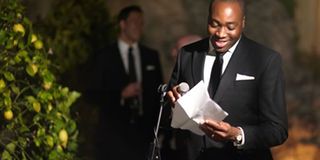Prime
Learn the art of public speaking

What you need to know:
Telling lies will ruin your reputation and make people doubt your sanity
We are smack in the middle of wedding season and boy oh boy. The things people say on these functions deserve a book of their own. I do not know why or when speeches were adapted as a Ugandan tradition but, I know that after the feasting, they are a crucial element of every function. While your guests will blame the bad food on the caterers and a poor ambience on the event planner, there is no one to blame for a bad speech but you.
First of all, people expect the host to say something beyond welcoming them and thanking them for attending. It does not matter whether it is a happy occasion or sad one; not saying anything speaks volumes and opens you up to unwanted scrutiny.
If you do not trust yourself to speak coherently off head, it is best you write your thoughts down to avoid talking about irrelevancies or as the Banyankore aptly call it okurandagatana. You have all been at those occasions where someone goes on and on until someone mercifully grabs the microphone from them. There are some things people do not need to know about you; after all knowing how the sausage is made ruins its taste.
But the most irritating and annoying so far are the people that laugh at their own jokes. So, it is wise to get out of your head and be present with your audience. Similarly, take a little liquid courage if you need it, but do not speak when you are so inebriated that you have no sense of propriety due to the influence of alcohol.
I have noticed that quoting a famous author or a verse from any of the holy books the Bible, Quran or the Bhagavad Gita will get your guests’ attention. But reciting a whole sonnet from Shakespeare smirks of pomposity and right down madness on your behalf. I once attended a wedding where a groom recited a whole sonnet for his bride complete with the fake British accent.
At the end of the performance, I wondered whether he had chosen a sonnet written about someone else because his bride was unable to invoke such creativity in him or if he was too lazy to put in the effort. Because everyone deserves to hear good things said about them by their loved ones, you going on a tangent about a British rose’s beauty instead of praising your Nakatudde is such a disservice to her.
Also, avoid quotes that may be inappropriate. For instance, do not say ‘‘every dog has its day’’ during a funeral or ‘‘those who live by the sword die by the sword’’ at a soldier’s burial. You will appear callous and on a bad day, you might end up facing the law.
Another simple way to capture your listeners’ attention and ease tension is telling a joke, but as tempting as this might be, avoid the off colour ones. Also, avoid jokes about tribes, people’s beliefs or bodies. However funny you think a joke is, someone will get offended.
While we want to talk up our friends or children, especially on such occasions when we have huge audiences, avoid blatant lies. First of all, remember that these people actually know the person you are talking about and those who do not, will be forced to verify your stories. Finding out that you were telling lies will ruin your reputation and make people doubt your sanity.
I understand the urge to want to make the dead seem respectable and holy but this too should have a limit. Recently, while attending a friend’s burial, one of his brothers during his speech claimed the man had worked with Bank of Uganda for 30 years. A gasp of shock went through the mourners because everyone knew that the deceased had worked with the bank for only three months in 1987 on a temporary contract. He had gone on to have other jobs but most of the time, he was unemployed. The claim did not only shock the mourners but established the brother as a liar.
Lastly, let your speech be like the proverbial mini skirt; short enough to arouse interest but long enough to cover the subject matter.




